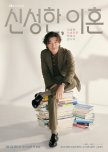
A Refreshing Side of Cho Seung Woo - Divorce - Class Difference and Social Issues
I love Cho Seung Woo as the corky Hwang Shi Mok in the Stranger series. It is the best he has ever done as an actor. Still, I would be remiss not to enunciate how much I enjoy him as Shin Sung Han, a great pianist turned divorce lawyer. I've never seen Cho Seung Woo like this, which could be why I greatly appreciate the character. His approach to the role of an uncle, friend, lawyer, and brother is brilliant. It suits him so much that it's hard to separate the actor from the character. I love how each episode addresses or tries to shed light on different divorce scenarios, and even though it's viewed as evil, sometimes it's a necessary evil. More importantly, I love SSH's approach to it.I commend the writer for Shin Sung Han, but all the credit goes to Cho Seung Woo for embodying such an intelligently funny, creative, caring, simple yet complicated man driven by love, grief, and the need for justice. It's not just Cho Seung Woo that shines in this drama. I love his tight-knit friendship with Jeong Moon Seong and Kim Seong Kyoon, how they feed off each other while at the same time always being acutely aware of each other's weaknesses, strengths, and pains, no words needed, knowing when to give each other the space they need and when to be each other's comfort. Truly each other's extensions. They are an accurate depiction of what and how friendship should be. I love it.
Many people try to hold on to a union for the wrong reasons. Some people do it solely for their children. Some do it because they think divorce will make them a failure and their family and society will ostracize them. Some even do it because they don't believe they can survive financially. The easiest thing to do to solve a problem is absolutely nothing. But, when one does nothing to appease family or society, that doesn't make the problem disappear. No one goes into a marriage thinking they will divorce. However, certain things in a marriage, be it gaslighting, cheating, or abuse (physical, mental, emotional), are unforgivable and require a divorce for the mental health of all involved. Getting a divorce, especially in a society such as South Korea and others like it, where it is considered taboo, has to be one of the most complex, if not the most frightening, decisions; I admire Divorce Attorney Shin for trying to convey in their special way that these are all pitfalls and misconceptions that stand in the form of progress.
I loved this drama's journey, but most importantly, I loved the ending. Yes, it was very K-drama-like, but I still liked it a lot. As much as Divorce Attorney Shin is about the social issues and suffering that arise from a hierarchical institution that, without thought or consequences, openly accepts social discrimination regarding different class marriages, divorce, custody issues, broken family relationships, parenting rights, and gender stereotypes, it is also an inspirational, dramatic story about adults and children struggling to live their mundane lives with these inherited issues. But rather than give in, they fight to be the change they want to see happen, to find their own way to a happy and fair life with the support of friendships and family ties that transcend blood relations.
The drama touches on many social issues, but none more important than the inequality perpetuated by the influence of historically structured social class differences that drive inequality and remain a hindrance to change. But the core of the story for me is the friendship between three friends who have a stronger bond than blood, which is the charm of this drama. I like that Shin Sung Han's final battle was not just about winning but about righting the wrongs adults made, yet a child was paying the price, one that was very personal to him. I will admit I thought the drama should have taken a much stronger stance towards the Vietnamese wife and the stepmom rather than backtrack on its strong message with the different cases it portrayed early on. I hope the message this drama tries to convey gets across, regardless. Yes, it's a work of fiction, but as far as I am concerned, there is always some truth in every fictional story.
Kudos to all the actors -- the adults but especially the child actors, the little men of this drama Kang Hyeon-U and Seo Gi-Yeong, who are mature far beyond their little ages, suffering in silence to protect those they love. They put the adults to share. Lastly, I would be remiss not to praise Noh Susanna, who was brilliant as Jin Yeong-Ju, the materialistically socially obsessed evil stepmom and wife who couldn't escape the influence and, worse, the trap of class hierarchy. I will miss Cho Seung Woo, but I hope to see him in Stranger 3, where he shines the most if the K-drama gods allow it.
Was this review helpful to you?
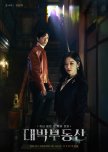
This review may contain spoilers
Jang Na Ra is Refreshingly Magnificent - Always
Sell Your Haunted House is one drama I'm really, really going to miss. I got so used to the magnificence that is Jang Na Ra every Wednesday and Thursday that I'm not sure what I will do for the next couple of weeks. But that said, I truly enjoyed this finale for its unexpected ending. I have to say I didn't foresee Do Hak Sung (Ahn Kil Kang) as an unrested spirit, so kudos to the writer for that very well-done twist. His exorcism was brilliant, one of my favorites of the series.Week after week, I found myself continuously saying the same thing repeatedly about the cases and the exorcisms -- this episodes' case of exorcism was the most fulfilling until I finally realized each case and exorcism were special on its own, be it for the message in them or the method. I don't think I exaggerate when I say besides having Jang Na Ra, the exorcisms and the stories they carried are the best parts of this drama.
As for Do Hak Sung, he wasn't so much of a villain as more of a thug and criminal who, to the very end, did not dare to recognize the errors of his way and let greed rule his life, destroying countless other lives in the process. They say greed is a bottomless pit that exhausts the person carrying it in an endless effort to satisfy a need without ever reaching satisfaction -- greed makes a man blind and foolish and makes him easy prey for death. I don't think better words would have described Do Kak Sung. Sealing his unrest spirit to eternally feel the pain he caused is a fate he more than deserved.
Kudos to all the actors in this drama, from the lead to the support, guest appearances, and production team -- a job well done. From Jung Yong Hwa to Kang Hong Suk, Kang Mal Geum, Baek Eun Hye, Ahn Kil Kang and Changhwa Restaurant owner Baek Hyun Joo. They each completed this drama, driving its ultimate message of letting go -- only when one lets go of past anguishes, grudges, and sorrows can they forgive themselves and find joy and love in the people around them. And what a lovely voice Jung Yong Hwa has - his rendition of the I Got You OST is excellent.
Was this review helpful to you?
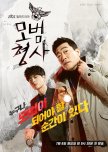
Exceptional Crime and Life Lesson Drama - Thank God for Season 2 -- Cannot Wait!
Indeed an exceptional drama, subtle but with a loud message. It only takes one good detective (Jang Seung Jo) and person to affect change and help others realize they each hold within them the change they want to see around them. My biggest takeaway from this drama is that only when you experience injustice do you realize how invaluable justice is -- justice is the sum of all moral duty and that injustice anywhere is a threat to justice everywhere. This drama revealed that the enemy of the truth is blind acceptance, and no matter what path an individual chooses the truth will always be the truth, even if no one believes it, and a lie is just a lie even if everyone chooses to believe it. Kudos to excellent penmanship, directing, and impeccable acting by Jang Seung Jo, Son Hyun Joo, Oh Jung Se, Lee Elijah, Seung Hyun, and all the others. I thoroughly enjoyed watching this refreshing drama and if you decide to watch it I am sure you will enjoy it as well. See you in Season 2Was this review helpful to you?
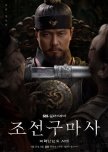
Fiction vs. Actual Events
Let me just start by saying I am very hurt that this promising drama never was. No disrespect intended, and I am sure there is a cultural difference at play here, but this drama wasn’t intended to be a documentary; I can understand the reaction if it were. It was never going to be accurate. A work of fiction never is; I mean, are they saying evil spirits/vampire-like living corpses were running around in the Joseon dynasty; is that the accurate part; I mean, come on; it feels a bit much to petition to the Blue House to cancel a show, a fictional one might I add. I'm dumbfounded. How come these very same viewers never reacted the same way to the overt abuse, be it emotional, physical, or sexual, and the vileness in some of the dramas; I am sure it depicts real-life scenarios around the country. I am not complaining but those acts depicted in the dramas I use this as an example. Come to think of it, were there any shows canceled because of that; I wonder. Very sad indeed at many different levels but on a personal one the most. I was so into this drama. I am going to need a very, very long minute to process this for sure!A friend here on MDL commented, "Ben Affleck’s Argo was akin to fiction when he made the heroes who rescued American hostages in Tehran the CIA operatives, rather than the actual Canadian Embassy diplomats and staff. He managed to tick off Britain, Iran, and of course, Canada in the process. There were no cries to have the film removed from screens everywhere. People stayed away in droves, thereby lessening box office results. That’s how you deal with this type of issue- hit them in the pocketbook. There’s no need to curtail other’s viewing of the film, flaws and all".
And I completely agreed and added that even as Argo was criticized for its inaccuracy, it was praised for the acting, directing, and editing. The film received seven nominations at the 85th Academy Awards and won three for Best Picture, Best Adapted Screenplay, and Best Film Editing. So, yes, criticize all you want but demanding the show be canceled, a fictional one that never claimed to be based on actual events, that is at a completely different level. It's akin to censorship, if you ask me. What kind of message does this send not just to writers and filmmakers in Korea but to the world, especially as SK starts garnering the international attention it so clearly deserves in filmmaking and acting.
The more I think of this situation's unfairness, the harder it gets to accept the decision to cancel the show. I've come across a couple of petitions on MDL, and I would very much love to see Netflix pick up this drama, so I include it here for those of similar mind. Sign this petition to save Joseon Exorcist http://chng.it/vn2XTNLdwB
#SaveJoseonExorcist
Was this review helpful to you?
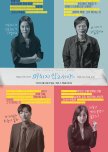
On The Verge of Insanity is Why Workplace Values Are Important
I greatly appreciate On the Verge of Insanity for tackling the challenges of surviving the corporate world from hierarchy/bureaucracy, dealing with change and difficult personalities, countering negativity, keeping the workforce engaged and motivated; nurturing and developing new skills in young talent, and first and foremost trying to but miserably failing to manage employee relations effectively. In that sense, the biggest challenge any company faces, especially HR, is taking on workforce reductions/layoffs, forced or otherwise.Layoffs within any company or organization have been a time-tested means of cutting costs. Reducing staff brings an immediate and substantial impact, whether reorganizing or selling off a company to benefit a few. In that sense, I can only imagine how the news of a forced layoff will affect the employees of Hanmyung Electronics; just the thought of it makes me shudder. It's so true when they say a good-performing employee is only as good as their manager -- it flows from the top to the bottom. Steve Jobs said it doesn't make sense to hire smart people only to tell them what they can do; we hire smart people to tell us what to do.
Each employee or worker has their own workplace values. And, while an organization or company can't always make sure each person's values perfectly align, they can try to hire people who fit, and vice versa, employees should make an effort to only work for companies or organizations that align with their core values. And this drama does a great job articulating what happens when values are out of alignment; people work towards different goals, with other intentions, and with different outcomes, which in turn damages work relations, productivity, job satisfaction, and creative potential. Hanmyung Electronics is a great example of that.
I have many memorable moments from this drama. I respect Ban Seok (Jung Jae Young) for restraining himself for as long as he had. Still, I think Ban Seok's head butting Se Gwon for being the coward and the thief he always was and continued to be despite the many chances he had will remain with me for a while; he had it coming for a time now. From the moment I started this drama, I knew Ban Seok would be the catalyst for change. He is authentic, resilient, emotionally intelligent, self-disciplined, and committed, a man of purpose qualities that set him far above everybody else. Despite knowing Se Gwon (Lee Sang Yeob) was hopeless, I still hoped. I wasn't disappointed in him but more myself for expecting.
Among the dramas that I watched simultaneously, On the Verge of Insanity is one I excitedly anticipated week after week and touched me the most. I commend the writer, director, and actors for making such a classy, relevant and realistic depiction of the challenges the workforce faces and the importance of workplace values both as an employer and an employee. I was pleased the drama shows this with Ban Seok as he works to build up his new company Banstone Company (I love the name), with workplace values that serve as a guiding principle. And I was even happier that On the Verge of Insanity highlights it as a critical message.
I appreciate all the cast for their stellar performances, but Moon So Ri, Jung Jae Young, Lee Sang Yeob, Jo Bok Rae, Kim Nam Hee, and Cha Chung Hwa. More importantly, for driving the message that when an organization's values align with its workforce, everyone does the right things for the right reasons. The common purpose and understanding help invest in the betterment of the organization; it stops being just about the paycheck and becomes a long-term investment.
Was this review helpful to you?

Legalized Abuse
Every episode of D.P. Dog is like a dagger to the heart; the issues it raises are dark but have depth, especially related to the abnormal practices the military service allows to continue. It's hard to take, let alone accept these practices actually translate into real life. Only when I read an article by director Han Jun Hee, who adapted Kim Bo Tong's webcomic with the same title, D.P. Dog Day, did I realize there was truth to the fiction. In the article, the director said he wanted to follow young men in their early 20s and depict what they go through while at the same time offering a drama that could resonate with audiences by laying out current underlying issues facing South Korean society.I relate to this drama differently because my country, too, follows a conscripted military service system. I understand the need for mandatory service, especially when a country is at constant war with its neighbor; the need to be ready is that much more potent. But forced conscription where if one tries to skirt around it may affect their future not just legally but culturally that I don't understand. My country has indefinite forced conscription for both men and women who suffer intolerable psychological and physical aftermath -- the indignity of it all isolated and forced to adapt to the military’s hierarchical and disciplinary culture all while being treated so inhumanely, be it economically, mentally, or physically it's no wonder the service is viewed as a chore to escape rather than patriotic duty -- that is what's hard to stomach.
That Cho's (Jo Hyun Chul) incident comes straight from the headlines of a case of a sergeant in 2014 who went on a deadly shooting spree, reportedly as revenge for repeated bullying, makes it even that much more regrettable. Joon Ho (Jung Hae In) wailing at the end at the loss of a life whose only crime was trying to live his life to the best of his abilities with the threat of legalized abuse was sorrowing and harrowing at the same time. I admire, praise, and commend the whole cast, they all did an amazing job, and I've gained so much appreciation for their great acting abilities. The same goes for the scriptwriter for scripting such a compelling story and the director for bringing to life this raw gut-wrenching yet at the same time eye-opening drama. I hope it catalyzes the change both the civilian and military society in South Korea and other countries across this globe so desperately need. This drama will remain with me for a long time to come and is one I highly recommend.
Was this review helpful to you?
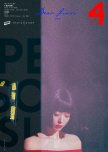
Window into the life of a Star who only wanted the chance to be herself
I can't say I knew Sulli or was even much of a fan, but her death deeply saddened me. She was everything the Korean entertainment industry needed for a positive, if not better, change. She became the change she wanted to see but sadly gave up on that change to the people who made her famous and who were also the ones who pulled her down to the lowest point that she felt the only escape was to leave it all to them. Given the opportunity, I truly believe she would have been the beginning of the change needed in the industry, making this documentary is proof of that. It is so hard to watch at times. For us fans, everything looks so glamorous watching from our TV screens. I can't fathom the hardship, discrimination, control, mental, physical, and even sexual abuse many of the stars we adore suffer to bring us the phantom joy we live in for a few hours or weeks.More than the short film, the interview was hard to watch, at least for me, hearing and in some instance feeling her pain, imagining the hardship, and ultimately, picturing the decline in mental health is truly heartbreaking. I wish she knew she had other options, but it is easy for me to say this now. I wish the people around her helped her realize there were other choices, including her management company. They must have witnessed her pain first hand. I genuinely believe the entertainment industry itself bears a lot of responsibility for her suicide and the many others like her. They treat celebrities like commodities from whom a few powerful agencies can squeeze as much income in as short a time as possible. They strip them of any semblance of a normal life, letting the fans go too far in their obsessions and sometimes giving into their demands of not allowing idols to be in relationships or even marry.
The crazy fans who obsessed over Sulli's life choices are also to blame for her death and the death of many gone too soon in this industry. I realize the many celebrity suicide deaths in the past decade or so have brought the issue of suicide and mental health to the forefront, as Korea has the highest rates among developed countries among civilians, and is attributed to academic and work pressure, the stigma around mental health, among others. I can't even begin to know the solution, but I would guess an open and honest dialogue like this one is a great start. Rest in peace, Sulli and the many others who left this earth too soon. I highly recommend giving this a try. Sulli earned at least that. I only gave the rewatch value an 8 because it was just too hard to watch at times.
Was this review helpful to you?
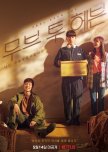
Highly Recommend -- Illuminating Journey of the Power of Love
I wasn't sure what to expect with Move to Heaven. I mean, I read the premise of it, but how many times have we all done that only to find the show or movie is nothing like the synopsis described it. One thing is for sure, though, it was quite an emotional ride, one I hadn't felt since My Mister and Chocolate. And not only that but it's beautifully produced, with vivid colors and tones. I knew I would enjoy the drama for the mere fact that Lee Je Hoon was in it, and it's the main reason I decided to watch it since it wasn't really in my plan to watch list, to begin with; I'm glad I did.There is no disputing the brilliance that is Tang Jun Sang as Han Geu Roo. But my favorite was Hong Seung Hee in her role as Yoon Na Moo. She was a blessing to have in and around Geu Roo throughout the drama in every sense of the word. I would be remiss not to mention Jung Ae Yun in the role of Madam Jung, the one character I disliked the moment I laid eyes on her. I mean, even before she uttered a word, and it never really got any better for her, no arc development or growth here, just pure greed. But with that said, the credit again goes to Jung Ae Yun and her ability to make me feel the way I did towards her character. Each character, the good and the bad leave an impact and makes Move to Heaven the great story that slowly and methodically unfolds on screen.
Everything about this drama works and works very well. From the touching stories in each of the commissioned trauma cleanings to the way Move to Heaven handles each case and the closure, care, and respect it provides to the dearly departed as well as those left behind to deal with the loss of their loved one. I truly commend the writer, the director, all the actors for bringing to life a drama about a young man who cannot change, whose whole life is anchored and defended by routine yet changes the lives of all those around him. And by the end of the first episode, I found myself feeling love for Han Geu Roo like he was related to me, which is a credit to Tang Jung Sang as an actor and how he plays the character. He doesn't play him as cute, lovable, or even pathetic, but a matter of factly, uninflected, unmoved except when his routine changes and he gets agitated until its balance is restored. And it's in those moments that I grew to love him even more than I had already started for what he was, and realized that's how the people around him felt about him too.
All the change in the drama belongs to Jo Sang Goo (Lee Je Hoon), who begins the drama as a me-first opportunist. But by the end, he learns to pay attention, listen, and be a little more patient while in the process gets to know the meaning of family and true love. Move to Heaven to me was about acceptance, unconditional love, and that being different is nothing to be afraid of but something to encourage and embrace. And it's a lesson we can all undoubtedly benefit from in our daily dealings with the people around us, be it family, friends, our neighbors, or mere strangers. Fantastic drama, and here is me wishing and optimistically waiting on the second season of this journey.
Was this review helpful to you?

Revenge is Sweet but Karma is Sweeter -- Amazingly Done and Yay to a second season
There is nothing I didn't like about this drama. Taxi Driver, to some, may have been another revenge drama, but to me, it was one of those dramas that dared not only to undertake, but also address some mammoth issues that sometimes overwhelmed. From labor and mental health abuse to significant workplace harassment, pornography, organ trafficking, thrill killers, statute of limitations, and the biggest and hardest to reconcile the abuse of an almost lawless justice system, that was seemingly instituted to preserve the rights of the powerless victims, but somehow ends up shielding the lawless and the criminals. It's true when they say, the only thing more hideous than crime is repressive justice. So, it's no surprise that the issues above birthed and justified a service such as Deluxe Taxi that empowered the victims and punished the lawless as befitted their crimes. But as sweet as revenge can get, karma is sweeter, which the drama clearly articulates at its ending. And as Jung Sung Chul (Kim Eui Sung) says, revenge only begets more revenge.The other thing Tax Driver unquestionably articulates is that if the criminal justice system intends to represent the victims and exact revenge by the law to dissuade people from self-help. It should then correctly do its job and not trivialize those it's supposed to protect. Just as people should be held accountable for their actions, so should the state, because there's a moral burden that comes from allowing heinous criminals and crimes not to be punished commensurate with their wickedness. I commend Kang Ha Na (Esom) and her Deputy Chief Prosecutor for recognizing that.
Taxi Driver's message is that revenge is never the answer, and neither is locking up criminals and throwing away the key. To achieve wide-ranging criminal justice reform, society and legislators need to overhaul how they think, dispense, and talk about social justice and crime. Because, as many experts have noted, how human beings describe each other either furthers their understanding and empathy or furthers othering and dehumanization. But what touched me most about Taxi Driver is the impactful and daring way it arrived at its final message. Everything from the system to the people who govern and are affected by it; are flawed humans, including our heroes. And that makes them more than capable of being the change they want to see.
As for the production -- well, a thousand and one kudos to the cast, the writer, the director, and production team of Taxi Drivers for a job beyond well done, but especially to Lee Je Hoon, this drama wouldn't have worked as well as it did without him. The same goes for Esom, Kim Eui Sung, Pyo Ye Jin; she was brilliant, and so was Cha Ji Yeon and the rest of the wonderfully talented cast. I will sorely miss this drama, but I look forward to seeing Lee Je Hoon in his next project -- Unframed and, if lucky, Taxi Driver 2. Highly recommended.
Was this review helpful to you?

This review may contain spoilers
Praiseworthy -- 10 stars all around!
You Are My Spring is praiseworthy for the characters, dialogues, and much-needed awareness it brings up and addresses. It mainly does a stellar job highlighting the devastating long-term effect and consequences of abuse, child or spousal, neglect, alienation, and trauma after. Not only that, it handles other misguided societal taboos and their aftermaths, primarily dating, particularly if sick, divorced, older, a celebrity, or in any way different than the acceptable norm. But more, the message it sends -- to change the way society looks at things; one must be the change they wish to see. I was expressly broken for the effect abuse left on both Ian Chase and Choi Jeong Min (Park Moon acted both roles) but primarily Jeong Min. Ian Chase confessing to his revenge scheme and things he made his brother do heartwrenching to watch.To see that not only did Ian and Jeong Min's parents fail to protect them, but so did the system. Every child needs and deserves unconditional love and protection provided by those who brought them into this world. What this drama highlights the most and presents so artistically is that parenting requires responsible and selfless choices. To love and protect children does not require money, as much as it requires parents to identify and heal their own trauma and pain. We see the healing unfold in Da Jang (Seo Hyun Jin), who as a child carried the burdens of her mother's miserable married life, same with Young Do (Kim Dong Wook), who believed he had to sacrifice himself to save his brother to please his mother those beliefs notwithstanding they were lucky enough to have a parent who protected and kept them safe, but Ian and Jeong Min did not have that. They weren't protected or safe, nor did they ever feel protected, safe, or loved. It's no wonder Ian pushed for the choices they did.
As much as I love Da Jang and Young, the side stories in this drama fill my heart even more, especially Ahn Ga Young (Nam Gyu Ri) and Patrick 9 Park Sang Nam), and the twins and mainly Eun Ha (Kim Ye Won). I adored her personality. She was strong-willed yet delicate at the same time in her pain. Parents unintentionally do many hurtful things to their children, and parental alienation is probably right up there with the worst of them. All the stories this series offered, everything from the laughs and cries and the sharing of despair, heartache, fear, and the ultimate healing and love, all were memorable moments. But none of the stories were as impactful as the unfitting story of Ian Chase and Jeong and how it unexpectedly tied into the heart of this gem of a drama. I love the emphasis You Are My Spring leaves with us in that human beings can not thrive alone and should look out for one another and that having a solid network of supportive family and friends helps enhance our mental well-being. It's that and the faith it places on the healing journey through the genuine relationships our characters form that help them confront, accept, embrace, and let go of their fears, guilts, pre-judgments, and pains.
As the saying goes, no man is an island - everyone needs support and comfort in both times of joy and distress. A standing ovation to my favorite S.K. actress Seo Hyun Jin, Kim Dong Wook for his brilliance, Yoon Park for making me believe him in his dual roles, Nam Gyu Ri for making me fall in love with Ga Young as well as her drama The Princess Forever, and Park Sang Nam with Patrick. Of course, no lead actors are ever complete without a strong support cast that makes them shine, and we have that and more in Kim Ye Won, Han Min, Ji Seung Hyun for getting me invested in their stories and the fantastic cameos, particularly Kim Nam Hee. They say actors are only as good as a script they can sink their teeth into, and the story and dialogue in this drama is proof of that. Kudos to the screenwriter for scripting such magic and the director for making it come to life.
Was this review helpful to you?
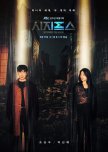
This review may contain spoilers
A Beginning and an Ending
In the weirdest of ways, I appreciated the ending a lot more than I thought I would, especially since it was unexpected, and as it unfolded, it made total sense. In that only in Han Tae Sul's death would everything be resolved, especially for the future. I admired Han Tae Sul for sacrificing himself in the present for a better future, not just for himself but for all those he cared about, and especially for Kang Seo Hae. The storyline that didn't work for me at all was Sigma. Things started going haywire from the moment he was introduced. Everything about him was totally insipid; even his manipulation or attempts at manipulation, should I say of the Bureau, Seung-bok, Sun, Han Tae Sul, and everyone and everything in between didn't feel as well-grounded as it should've been for a villain of his magnitude. I mean, he is the guy who brings about the end of the world, yet I couldn't take him seriously.The other biggest failures aside from Sigma for me were Seo Jin and Seung Bok, as prominent as they were at the beginning of the drama as non-existent towards the end; I almost forgot about them that when they reappeared, I just wasn't interested nor did I care. As a matter of fact, I wasn't even sure what roles they continued to play even when Seung Bok threatens Tae Sul and Seo Hae at the end rather than menacing, it felt contrived, and his reasoning, the age-old jealousy felt so uninteresting. The villains in this drama did, however, have one thing in common the intensely personal feeling of inadequacy and hate towards Han Tae Sul for being their total opposite.
As I said, I didn't expect a glamorous ending, but I was pleasantly surprised, not that it was glamorous, but it was indeed interesting. I give it to the writer and director. I liked the last 10 minutes of the finale and wished the show had spent more time reflecting on that rather than on Sigma and his self-pitying, hate, narcissism, jealousy, egotism, obsession, and doubt. I doubted we would get a meaningful ending, but we did -- once we get to self-interpret an ending of our liking. In the end, this was nothing more than a love story.
I love the first half of this drama, but towards the second half of this drama, I started getting this feeling that Sisyphus failed me somehow, but then I probably failed it too for not fully grasping its storytelling. I do, however, fully appreciate the acting, especially Jo Seung Woo as Han Tae Sul, Park Shin Hye as Kang Seo Hae, and Sung Dong-II as CEO Park and Sung Dong-II in particular. He was piercing in the role of a broker torn by his past self's emotional indulgences and his present self waiting, pinning to save those who matter to him most yet at the same time failing to recognize they were with him all along. I will miss Jo Seung Woo and hope the next time I see him in a drama, it will be Stranger 3.
Was this review helpful to you?
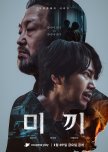
Dark and Gritty but so Good
Bait is a very well-plotted drama that, in only two episodes, has cleverly evolved, and if it stays its course of successfully telling the story in the coherent way it has in the next four episodes, it will be one of the best crime/thrillers of 2023. It's dark, gritty, and an in-your-face kind of crime/murder thriller that's intensely captivating. A successful strategy for keeping a mystery captivating is to maintain the core of the mystery episode-by-episode while at the same time nimbly tying in the larger picture as the other elements unfold, and Bait does it so well in just two episodes.Everything from the cinematography, the lighting or lack of it, the set, the actors, and the theme is so well thought of it is hard not to get sucked into the drama and the story. Additionally, there's some strong acting from the ensemble cast, with Jang Geun Suk, in particular, carrying the material. He looks terrific. I didn't recognize him. I am hooked. And what a cliffhanger of an ending for the first part of this drama. Everything worked, from the serial killing mystery to the cat and mouse chase and most of all Jang Geun Suk. He is just fantastic in this drama.
Was this review helpful to you?
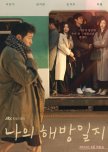
Liberating and Worship Worthy
My Liberation Notes is a drama that resonated with me in many ways. Just watching it made me feel like I, too, am being liberated, and I wasn't even half as deep as where the characters were, if at all. But then, who can't relate to the struggles of fading youth, wanting to love and be loved, managing mounting responsibilities to the extent of losing the will for idle talk, and the unavoidable frustrations and challenges of daily lives when even living itself is burdensome, not many.I loved how the story handled itself, and the message that liberation is realizing the voices in our heads aren't who we are, and only when we see that can we indeed be free. I felt liberated by how this drama depicted human relations, giving me the sense to appreciate the people in my life and opening me up to accept those to come in the future, something my old self before My Liberation Notes wouldn't have done. Every relationship in this drama mattered no matter how small, which made it so special.
I loved how real this drama was in expressing real people's thoughts and actions; how it addressed the fact that some people put others down, not because they are evil or rotten human beings, but because sometimes it's the only way they know how to feel better about themselves. And that sometimes all a person needs is the knowledge that someone cares to make a difference.
More than any other drama, My Liberation Notes made me realize how blessed I was in my life rather than the life I think I should've had. I would not have had that without going on this fantastic, silent yet deeply touching and meaningful journey with Gu, Mi Jung, Ki Jung, Chang Hee, Tae Hun, and everyone else who was part of this story, whether in a prominent or supporting role. There were many touching and emotional moments in this drama, but the Yeom children gathered for their father's birthday, and him finally opening up to them is one of the best. The geninue moments between Gu and Mi Jung, Ki Jung her boss and Tae Hun, Chang Hee at work and with his friends -- all of the little nuisances in the storytelling made this drama one of the best if not the best of 2022. A thousand and one kudos to the writer who excelled at making me feel and live each step of this drama's journey. The director for bringing it all to life, and the actors for quietly yet forcefully imparting to me the message that life is what we make it, always has been, and always will be; we just need to believe that. I felt worshiped just watching this drama.
I will miss My Liberation Notes. As much as I already enjoyed Lee Min-Ki and Son Seok Koo's acting skills in other projects, their natural way of depicting their roles in this one made me realize how talented they are, and the same goes for Kim Ji Won, Lee El, Lee Ki Woo, Chun Ho Jin and the rest of the cast. Next to My Mister and Lost My Liberation Notes will remain with me for a long time to come for silently making me hear the things I unconsciously and sometimes consciously ignored. Ignore what you may have heard or read about this drama; watch it you will never be disappointed; on the contrary, you may learn something about yourself you didn't know before.
Was this review helpful to you?
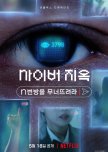
Cyber Hell: Exposing an Internet Horror
6 people found this review helpful
Hell
Cyber Hell is intensely powerful and not in a good way, it's horrifying and mind overwhelmingly maddening. I couldn't stop crying, actually bawling tears of rage. I have never felt the way I did as I watched this, and that says a lot as I am an avid true-crime documentary watcher. The thought that human beings can stoop so low as to terrorize other humans (children not older than eight years old, teenagers, and women), the way the criminals depicted in this documentary did is unimaginable to me -- words fail me.A true-crime documentary recounting a South Korean case in which chat room operators blackmailed young women (more like teenage girls) into sending explicit videos between 2018 and 2020 is tormenting. The thought that while I watched and filled my eyes with beautiful k-dramas, adolescent girls and women were experiencing the horror of this documentary is unspeakably horrific to me.
The synopsis described this case as a sexual slavery ring, an understatement. That it took place almost exclusively over Telegram, where thousands watched, shared, and reshared images of girls and women forced to send demoralizing pictures of themselves so a bunch of cowards could advertise and sell them for money is hard to accept even as one watches it unfold. To say that a bunch of soulless men and boys, for that matter, thought that it was perfectly okay to humiliate and demean someone's sister, daughter, cousin, and friend is what I struggled to reconcile as I watched the events of what I can only describe as ineffable.
Just thinking of this case fills me with rage—shame on the blackmailer(s) who started such an atrocity. But God heavens, those who participated, enjoyed, and perpetuated the actions are the actual monsters -- the depravity is unimaginable. It leaves me thinking about how, why, and when such young people lost their humanity to the extent that they believed inflicting the type of atrocities as the likes depicted here was fun. It's beyond anything that I have ever heard of or could imagine.
I commend everyone involved in bringing this case to light. Those who produced it to the whistleblower, reporters, tv producers, civilians, well-intended hackers, and the police who worked tirelessly to shut down this demeaning crime. But most importantly, the victims who endured the degradation and humiliation of their souls. If this documentary highlighted anything, it's that women are dramatically less safe and private on the internet than men, the mothers, sisters, aunts, cousins, and daughters of society. They are the true heroes of this documentary.
Was this review helpful to you?
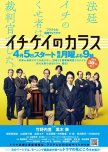
Iruma Michios -- A very uniquely done courtroom/law drama
I started this drama as it was coming to its end, and I loved how simple yet deep it is in its dialogues and execution. For example, when Iruma Michio told Nagaoka Makoto it was up to him to decide how he accepts the truth about his father and his death in episode one, probably one of the most explosive episodes along with all the other episodes the only thing I could think was how powerful that one sentence was -- brilliant drama, and this was just me watching the first episode. At the time, I could only imagine how much better the drama would get, and it did. It not only tackled the law and the injustices it commits but also touches on how the elite view the law and the twisted perceptions they impose on it to benefit themselves. I wish the world were full of Iruma Michios.As I watched this drama, I was reminded of Frederick Douglass's quote when he said. "Where justice is denied, where poverty is enforced, where ignorance prevails, and where any one class is made to feel that society is an organized conspiracy to oppress, rob, and degrade them, neither persons nor property will be safe." A very uniquely done courtroom/law drama presenting the heart of the law while applying the rule of law with a brilliant cast in the marvelous Takenouchi Yutaka as the very humanistic judge Iruma Michio aiming to render the "correct" judgment, not just the politically acceptable one.
When they say it is not power that corrupts but fear, they are absolutely right -- fear of losing power corrupts those who wield it, and fear of the courage of power and what is different corrupts those who are subject to it. So, in that sense, it's not that Iruma is different, but in how he interrupts the law as it was meant to be in that justice cannot be for one side alone but must be for both sides and parties regardless of one's station in life.
Such a simplistic drama, yet it manages to raise such piercing questions in how the higher-ups in the legal system and the general public view and interpret law and justice. And to that end, I am a complete sucker for dramas with bold messages, and Ichikei no Karasu's was clear that true freedom requires the rule of law and justice and a judicial system in which the denial of rights to others does not secure the rights of some. And that judges should not just interpret the letter of the law but understand it and apply it fairly and justly.
Undoubtedly the drama and Iruma Michios wouldn't have been as good with the support of its wondrous cast in Judge Komazawa Yoshio, who makes it possible for Iruma and the rest of his team to be who they are - true to themselves and the judgments they consciously render; Nakamura Baijaku as Chief Secretary Kawazoe Hiroshi, and law clerks aIshikura Bunta, Sakurai Yuki (Sakurai Yuki), Ichinose Itoko (Mizutani Kaho), and prosecutors Ide Iori (Yamazaki Ikusaburo) and Ichinose Itoko (Masu Takeshi). I love how principled this drama was to the end. Highly recommend it.
"Until justice is blind to color until education is unaware of race, and until opportunity is unconcerned with the color of men's skins (statues), emancipation will be a proclamation but not a fact" ~ Lyndon B. Johnson.
Was this review helpful to you?

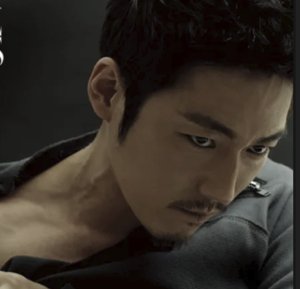
 1
1





















